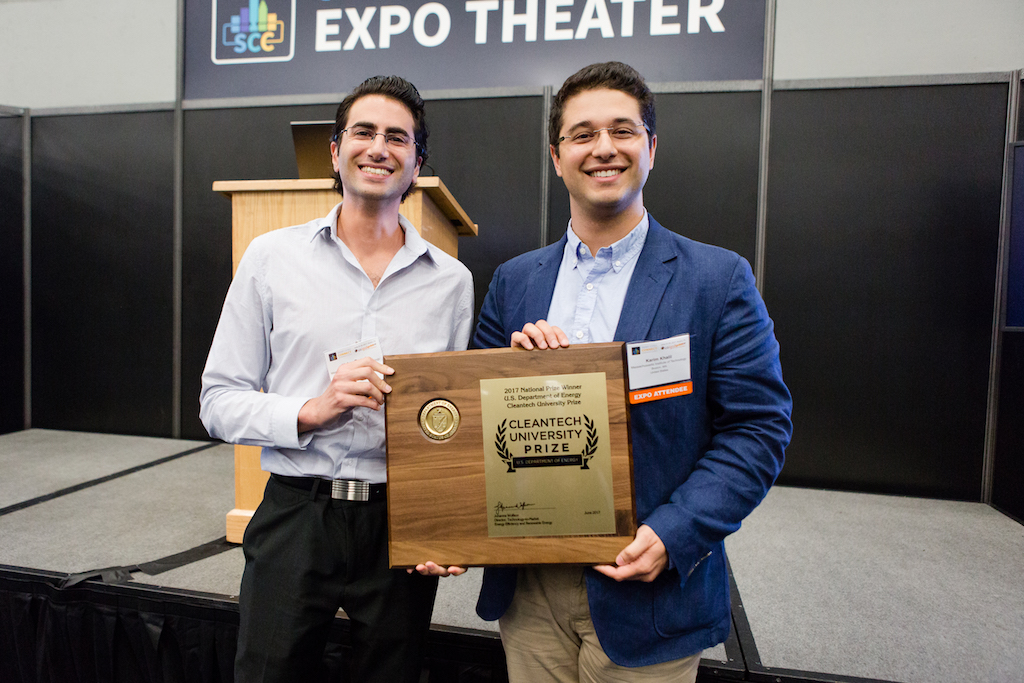
At American universities across the nation, early-stage innovators are discovering new solutions to our energy challenges. However, turning a game-changing technology into a commercial product requires more than time in a lab. Cleantech University Prize (Cleantech UP) business plan competitions provide aspiring student inventor-entrepreneurs with the mentorship, business development skills and training, market exposure, and investor and industry feedback to transform their clean energy ideas into viable, impactful businesses.
We recently spoke with first-place winners of the 2017 Cleantech UP National Competition, Infinite Cooling. The company’s co-founders, Karim Khalil and Maher Damak, highlight the motivation behind their water-saving innovation for power plants, and explain how Cleantech UP provided them with the resources and confidence to move forward with their venture.
Quenching Power Plants’ Thirst for Water
In the United States, 90% of electricity comes from thermoelectric power plants that require cooling. The cooling process uses an enormous amount of water – every day. “A 250 megawatt power plant uses approximately 3,000 gallons of water every minute.” said Damak. To make matters worse, drought and rising energy demands are putting water supplies and power plants at risk.
While studying at MIT, Khalil and Damak discovered an opportunity in the cooling process. “We devised a way to capture steam escaping from cooling towers and reintroduce the resulting water into the cooling system,” said Khalil. Today, the team’s patent-pending technology can potentially reduce power plant water consumption by 20 to 30 percent.
“Our technology has the potential to save millions of gallons of water each year,” said Damak. “Lowering water usage also translates into saving millions of dollars each year for our customers.”
Making an Impact through Sustainable Technology
According to Khalil, inventing a sustainable technology was important from both an environmental and economic perspective. After an in-depth customer discovery process, Infinite Cooling realized that the innovation needed low energy requirements.
“Saving water from a power plant is not a novel idea. In order to differentiate ourselves and make an impact, we had to create a technology that didn’t require a significant amount of energy to operate. An energy-intensive technology could outweigh the savings in water, and dissuade power plants from adopting the technology.” To further validate the low-energy usage of their technology, the team will launch a full-scale pilot of their innovation this summer at MIT’s cogeneration power plant. They’ll also install sensors to monitor the plant’s water usage and gather data on the change in consumption. Once their initial pilot is complete, the team plans to begin conversations with potential customers they met at the national competition.
Empowered by Cleantech UP
Infinite Cooling’s recent success at the 2017 Cleantech UP National Competition has been instrumental in funding their pilot, honing their business model, and bringing their product closer to market.
“The Cleantech UP competition was valuable in many ways,” said Damak. At the national competition, Damak and Khalil were introduced to investors, potential customers, and other industry representatives who took great interest in Infinite Cooling.
Throughout the competition, the team also received training, investor feedback, and personalized coaching. “The mentorship and coaching were very valuable,” said Khalil. “For instance, we thought the information in our pitch was clear, but the mentors showed us that key details weren’t coming through. They really helped us hone our presentation.”
Advice for Future Student Entrepreneurs
After completing the business plan competition process, Khalil and Damak have some valuable advice for future student innovators embarking on the same journey.
“Utilize all of the resources at your university before trying to go it alone,” said Khalil. “Also, participate in as many of startup competitions as possible. They not only allow you to practice your pitch and gain valuable advice from mentors and industry, they give you a sharp deadline. You have to generate traction and accomplish as much as possible before the startup competitions. That deadline is very motivating and helps you focus your efforts.”
Damak also encourages entrepreneurs to develop their minimum viable product. “Whenever you have a tangible item to show to a potential customer, partner, investor, it makes your idea that much more real. It gives you more credibility,” he said.
Learn more about the 2017 Cleantech UP National Competition’s finalists and winning teams.